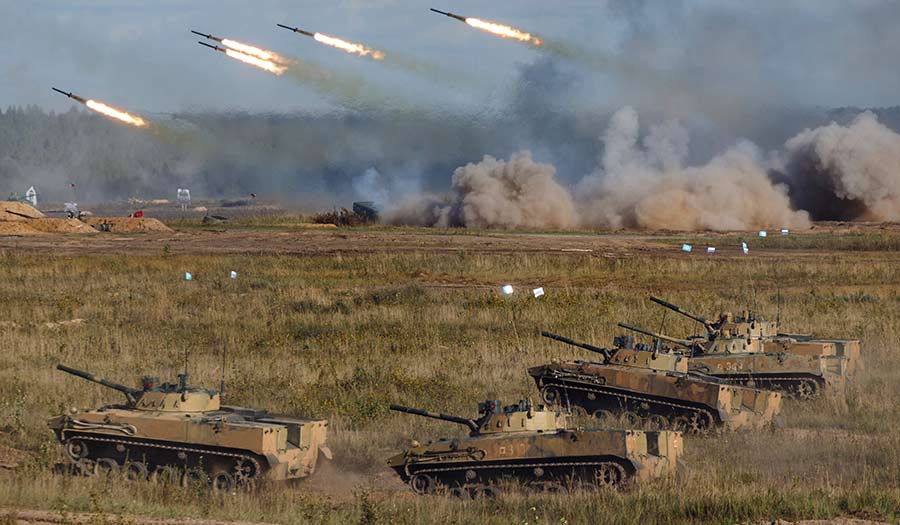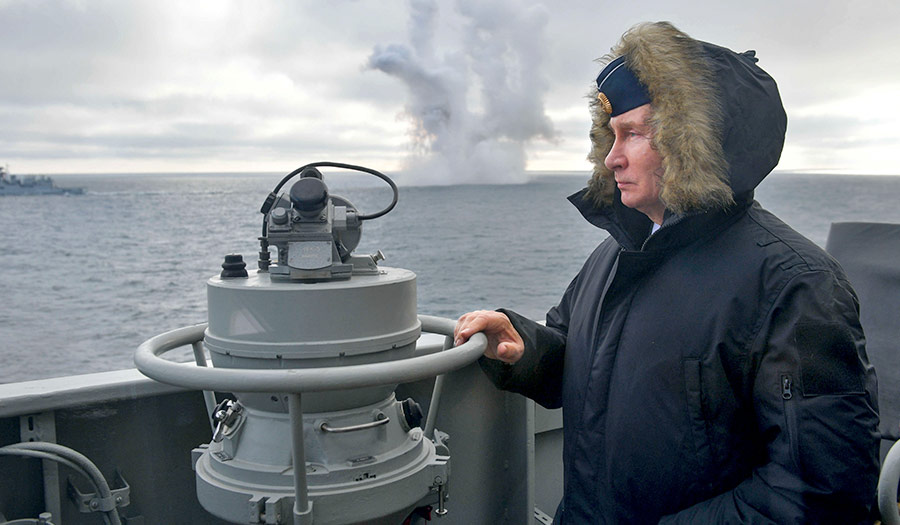 Vadim Savitskiy/Russian Defense Ministry Press Service via AP
Vadim Savitskiy/Russian Defense Ministry Press Service via AP
World News Desk
Learn the why behind the headlines.
Subscribe to the Real Truth for FREE news and analysis.
Subscribe NowMOSCOW (AP) – Russia on Friday published draft security demands that NATO deny membership to Ukraine and other former Soviet countries and roll back the alliance’s military deployments in Central and Eastern Europe—bold ultimatums that are almost certain to be rejected by the U.S. and its allies.
The proposals, which were submitted to the U.S. and its allies earlier this week, also call for a ban on sending U.S. and Russian warships and aircraft to areas from where they can strike each other’s territory, along with a halt to NATO military drills near Russia.
The demand for a written guarantee that Ukraine will not be offered membership already has been rejected by the West, which said Moscow does not have a say in NATO’s enlargement.
NATO’s secretary-general responded Friday by emphasizing that any security talks with Moscow would need to take into account NATO concerns and involve Ukraine and other partners. The White House similarly said it is discussing the proposals with U.S. allies and partners, but notes that all countries have the right to determine their future without outside interference.
The publication of the demands—contained in a proposed Russia-U.S. security treaty and a security agreement between Moscow and NATO—comes amid soaring tensions over a Russian troop buildup near Ukraine that has raised fears of an invasion. Moscow has denied it has plans to attack its neighbor, but is seeking legal guarantees precluding NATO expansion and deploying weapons there.
Deputy Foreign Minister Sergei Ryabkov said Russia’s relations with the U.S. and NATO have approached a “dangerous point,” noting that alliance deployments and drills near Russia have raised “unacceptable” threats to its security.
Moscow wants the U.S. to start talks immediately on the proposals in Geneva, he told reporters.
NATO Secretary-General Jens Stoltenberg said the alliance had received the Russian documents, and noted that any dialogue with Moscow “would also need to address NATO’s concerns about Russia’s actions, be based on core principles and documents of European security, and take place in consultation with NATO’s European partners, such as Ukraine.”
He added that the 30 NATO countries “have made clear that should Russia take concrete steps to reduce tensions, we are prepared to work on strengthening confidence building measures.”
President Vladimir Putin raised the demand for security guarantees in last week’s video call with U.S. President Joe Biden. During the conversation, Mr. Biden voiced concern about a buildup of Russian troops near Ukraine and warned him that Russia would face “severe consequences” if Moscow attacked its neighbor.
U.S. intelligence officials say Russia has moved 70,000 troops to its border with Ukraine and is preparing for a possible invasion early next year. Moscow denies any intention to attack and accused Ukraine of planning an offensive to reclaim control of rebel-held eastern Ukraine—an allegation Kyiv has rejected.
Fighting between Ukrainian forces and Russia-backed separatists in eastern Ukraine began after Russia’s 2014 annexation of Ukraine’s Crimean Peninsula. It has killed over 14,000 people and devastated Ukraine’s industrial heartland, known as the Donbas.
The Russian demands would oblige Washington and its allies to pledge to halt NATO’s eastward expansion to include other ex-Soviet republics and rescind a 2008 promise of membership to Ukraine and Georgia. The alliance already has firmly rejected that demand from Moscow.
- Real Truth Magazine Articles
- INTERNATIONAL
 Russia on the Brink of War?
Russia on the Brink of War?
More on Related Topics:
- German Chancellor Loses Confidence Vote, Setting Up an Early Election in February
- French Government Felled in No-confidence Vote, Deepening Political Crisis
- What Does President Biden’s Decision to Allow Ukraine to Use Longer-range U.S. Weapons Mean for the War?
- Born into War, Ukraine Toddlers Adjust as Conflict Nears 1,000 Days
- Ukraine’s Surprise Cross-border Incursion Seen as a Tactical Reply to Russia’s Grinding Gains


